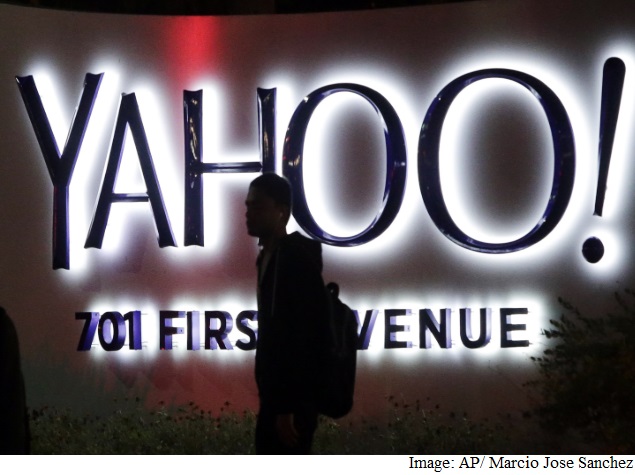- Home
- Internet
- Internet News
- Yahoo to Spin Off Its Stake in Alibaba
Yahoo to Spin Off Its Stake in Alibaba

The decision, which Wall Street has been waiting for since Mayer joined the company in 2012, cheered shareholders because they will directly reap all the remaining profit from Yahoo's prescient investment, which cost almost nothing a decade ago but is now worth about $39.5 billion (roughly Rs. 2,42,850 crores).
In the process, Yahoo will avoid any taxes on the transaction but will be stripped of its single most valuable asset. The Alibaba stake alone now makes up nearly 85 percent of Yahoo's market value.
Resolving the Alibaba question now turns the spotlight on Mayer's plans to turn around Yahoo's core Internet advertising business, which has dealt with years of declining revenue as advertisers and Internet users switched their money and attention to flashier, more innovative services from competitors like Google, Facebook and Twitter.
Mayer delivered a report card on her turnaround plan on Tuesday, noting that overall revenue and profit fell in the fourth quarter. But the company's mobile businesses, as well as other newer initiatives, like so-called native ads, showed rapid growth.
Still, the immediate reaction to the Alibaba announcement was positive, with investors driving Yahoo's stock up about 7 percent in after-hours trading after disclosure of the plan.
"It's kind of hard not to view it as an unadulterated positive," said Mark Mahaney, who follows the Internet industry for RBC Capital Markets. "This was the single biggest issue raised by activists."
The Alibaba news overshadowed Yahoo's report on its fourth-quarter results, which gave little indication that Mayer's turnaround plan was taking hold.
Yahoo reported revenue of $1.25 billion (roughly Rs. 7,685 crores) and adjusted profit of 30 cents a share in the quarter, slightly exceeding Wall Street's expectations. Analysts had on average expected the company to report revenue of $1.18 billion (roughly Rs. 7,254 crores) and adjusted earnings of 29 cents a share, according to data collected by S&P Capital IQ.
The company's net income was $166 million (roughly Rs. 1,020 crores), or 17 cents a share, in the fourth quarter, compared with $348 million (roughly Rs. 2,139 crores), or 33 cents a share, in the same quarter a year ago.
Yahoo sold a hefty chunk of its stake in Alibaba in September when the Chinese company sold shares in an initial public offering. Yahoo had a $10.3 billion (roughly Rs. 63,325 crores) gain from the sale, but nearly 40 percent of that was eaten up by taxes.
Yahoo executives promised shareholders that they would find a way to dispose of the rest of the Alibaba stake in a way that incurred a much lower tax bill. Their solution - a spinoff of the Alibaba stake and a Yahoo operating business - avoids $16 billion (roughly Rs. 98,369 crores) in corporate taxes that Yahoo would have owed if it had simply sold the stake, executives said.
Investors will receive shares in the spun-off company in proportion to their stakes in Yahoo, and will pay taxes on their capital gains when they sell those shares. But the plan will not give Yahoo a new pile of cash with which it could make big acquisitions.
The spinoff is expected to be completed in the fourth quarter.
One investor, the activist hedge fund Starboard Value, had threatened to wage a fight over the company's board if it was unhappy with Mayer's strategy. Starboard did not respond to requests for comment on Yahoo's spinoff plan.
An Alibaba spokesman also declined to comment.
Yahoo said it was not ready to discuss its plans for its other large investment, its 36 percent stake in Yahoo Japan, worth $7.3 billion (roughly Rs. 44,881 crores). Although Yahoo has signaled that it would eventually like to dispose of that stake, too, the two companies have some intertwined operations and share intellectual property, so unwinding the relationship would be more complicated than the Alibaba spinoff.
Yahoo's principal business - selling ads against articles, videos and search results shown to its hundreds of millions of visitors - continues to falter. Yahoo was late to recognize that people around the world were switching to mobile phones and tablets for access to the Internet, leaving it to play catch-up when Mayer arrived.
In 2014, Yahoo's share of the $146.4 billion (roughly Rs. 9,00,084 crores) worldwide digital ad market fell to 2.36 percent, according to eMarketer, a research firm. Google, the market leader, had 31.1 percent of the market, and Facebook had 7.75 percent.
Mayer said in a conference call that the company was seeing strong growth in its mobile, video, social and native advertising businesses - a group she called "the mavens." She said that collectively, revenue from the mavens grew 95 percent in the fourth quarter compared with the same quarter in 2013. For the full year, those businesses brought in $1.1 billion (roughly Rs. 6,762 crores) in revenue.
Yahoo said that it had 575 million monthly users on mobile devices in the fourth quarter, including users of its Tumblr social network, up 18 percent compared with the previous year.
But revenue from Yahoo's traditional businesses continued to flag. Display advertising - the banner ads that made the company a juggernaut a decade ago - fell about 4 percent, and revenue from Internet searches was up 1 percent.
The company also gave disappointing projections for its performance in the first quarter, Mahaney said.
"There is no news here that tells you Yahoo has fundamentally turned the corner," he said.
Mayer, who built her reputation overseeing Google's Internet search business, said that Yahoo remained committed to search.
The company is discussing changes to its 10-year search partnership with Microsoft, which is at the midway mark. In November, Yahoo struck a deal to displace Google as the default search service on Mozilla's Firefox Web browser, which accounts for 3 to 5 percent of searches.
Mayer also said Yahoo would seek to replace Google as the default search engine on Apple's Safari browser. "Safari users are the most engaged and lucrative in the world," she said.
© 2015 New York Times News Service
Catch the latest from the Consumer Electronics Show on Gadgets 360, at our CES 2026 hub.
Related Stories
- Samsung Galaxy Unpacked 2025
- ChatGPT
- Redmi Note 14 Pro+
- iPhone 16
- Apple Vision Pro
- Oneplus 12
- OnePlus Nord CE 3 Lite 5G
- iPhone 13
- Xiaomi 14 Pro
- Oppo Find N3
- Tecno Spark Go (2023)
- Realme V30
- Best Phones Under 25000
- Samsung Galaxy S24 Series
- Cryptocurrency
- iQoo 12
- Samsung Galaxy S24 Ultra
- Giottus
- Samsung Galaxy Z Flip 5
- Apple 'Scary Fast'
- Housefull 5
- GoPro Hero 12 Black Review
- Invincible Season 2
- JioGlass
- HD Ready TV
- Laptop Under 50000
- Smartwatch Under 10000
- Latest Mobile Phones
- Compare Phones
- Tecno Spark Go 3
- iQOO Z11 Turbo
- OPPO A6c
- Samsung Galaxy A07 5G
- Vivo Y500i
- OnePlus Turbo 6V
- OnePlus Turbo 6
- Itel Zeno 20 Max
- Lenovo Yoga Slim 7x (2025)
- Lenovo Yoga Slim 7a
- Lenovo Idea Tab Plus
- Realme Pad 3
- Garmin Quatix 8 Pro
- NoiseFit Pro 6R
- Haier H5E Series
- Acerpure Nitro Z Series 100-inch QLED TV
- Asus ROG Ally
- Nintendo Switch Lite
- Haier 1.6 Ton 5 Star Inverter Split AC (HSU19G-MZAID5BN-INV)
- Haier 1.6 Ton 5 Star Inverter Split AC (HSU19G-MZAIM5BN-INV)

















